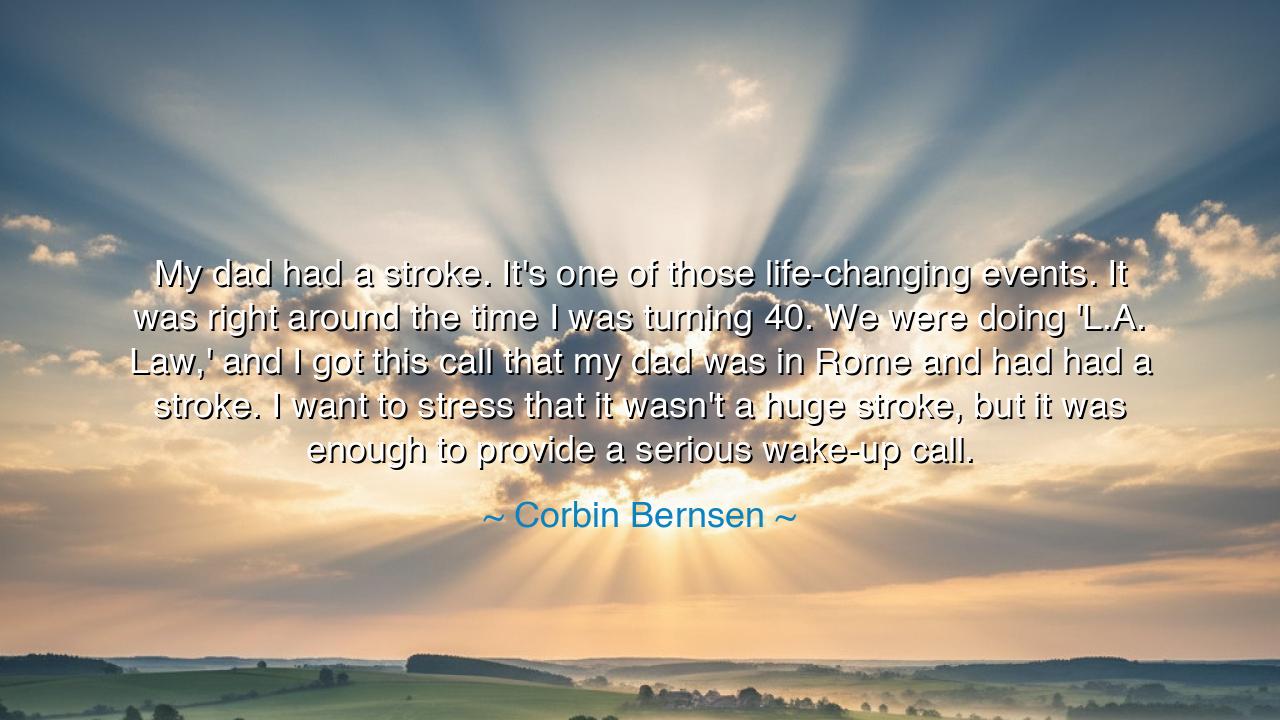
My dad had a stroke. It's one of those life-changing events. It
My dad had a stroke. It's one of those life-changing events. It was right around the time I was turning 40. We were doing 'L.A. Law,' and I got this call that my dad was in Rome and had had a stroke. I want to stress that it wasn't a huge stroke, but it was enough to provide a serious wake-up call.






When Corbin Bernsen said, “My dad had a stroke. It's one of those life-changing events. It was right around the time I was turning 40. We were doing 'L.A. Law,' and I got this call that my dad was in Rome and had had a stroke. I want to stress that it wasn't a huge stroke, but it was enough to provide a serious wake-up call,” he was speaking not merely of a family crisis, but of the profound awakening that life’s fragile moments can bring. In these words, we find the echo of a timeless truth — that mortality is the greatest teacher, and that sometimes the softest blows of fate strike the deepest chords in the soul. His father’s stroke, though not catastrophic, became a mirror in which Bernsen glimpsed the fleeting nature of time, love, and life itself.
The origin of this quote lies in Bernsen’s own life as both an actor and a son — a man standing at the crossroads of midlife, success, and sudden vulnerability. In the glittering world of television, where fame can cloud the deeper questions of being, this event pierced through illusion and reminded him that beneath achievement lies mortality, and beneath the rush of ambition lies the quiet rhythm of the heart. He was in his forties, an age when one begins to see not only the path ahead but also the trail behind, when the strength of one’s parents begins to wane, and the weight of continuity — of carrying forward their legacy — begins to stir. What began as a moment of fear became, as he said, a “wake-up call”: a summons to reflection, gratitude, and renewed purpose.
Such awakenings are known to all who have lived long enough to witness the frailty of those they once saw as invincible. The ancients called these moments memento mori — reminders of death, not to breed despair, but to rekindle awareness of what is precious. When a parent falls ill, the child, no matter his age, feels the foundations of the world tremble. For parents are our first gods — and to see them weakened is to see the illusion of permanence shatter. Yet from that shattering often arises wisdom. Bernsen’s words reveal that even a small stroke, a brief interruption in the rhythm of life, can awaken the heart more powerfully than years of comfort ever could.
Consider the story of Marcus Aurelius, the philosopher-emperor, who watched plague sweep through the Roman Empire. Surrounded by sickness and death, he did not yield to despair, but wrote in his Meditations: “Do not act as if you had ten thousand years to live. Death hangs over you. While you live, while it is in your power, be good.” Like Bernsen, he saw that awareness of fragility does not paralyze the wise — it strengthens them. It reminds them that every breath, every conversation, every act of love must be embraced fully, for tomorrow is never promised. Thus, the shadow of mortality becomes the light of purpose.
Bernsen’s “wake-up call” was not only about his father’s health, but about his own life. At forty, the age of reckoning, he found himself measuring time differently — not in projects or fame, but in meaning. The stroke of his father’s heart echoed in his own: a reminder to live more consciously, to love more deeply, to slow down and see the world with gratitude. For it is one thing to speak of mortality in abstraction, and another to have it touch one’s blood. Many men awaken only when life shakes them from the trance of routine; few listen before the thunder strikes.
Yet, in his reflection, there is also tenderness — a recognition that such trials, though painful, are gifts in disguise. They strip away vanity and leave behind the essence of being. The heart that once rushed begins to listen. The eyes that once looked outward begin to turn inward. Bernsen’s father recovered, but the son was transformed. This is the secret blessing hidden in suffering: it awakens gratitude not through abundance, but through the nearness of loss. It teaches that love unspoken is love half-lived, and that life postponed is life wasted.
So, my child, learn from Corbin Bernsen’s words: do not wait for the wake-up call. Do not wait for illness, tragedy, or age to remind you that your days are numbered and your love finite in its expression. Look now upon those who raised you, those who walk beside you, and those who depend on your care. Tell them what they mean. Live your life with intention, not delay. For every sunrise is a fragile gift, and every heartbeat a silent miracle. When life taps gently upon your shoulder — or when it strikes, as it did for Bernsen — may you, too, awaken not to fear, but to gratitude, resolve, and love renewed.






AAdministratorAdministrator
Welcome, honored guests. Please leave a comment, we will respond soon